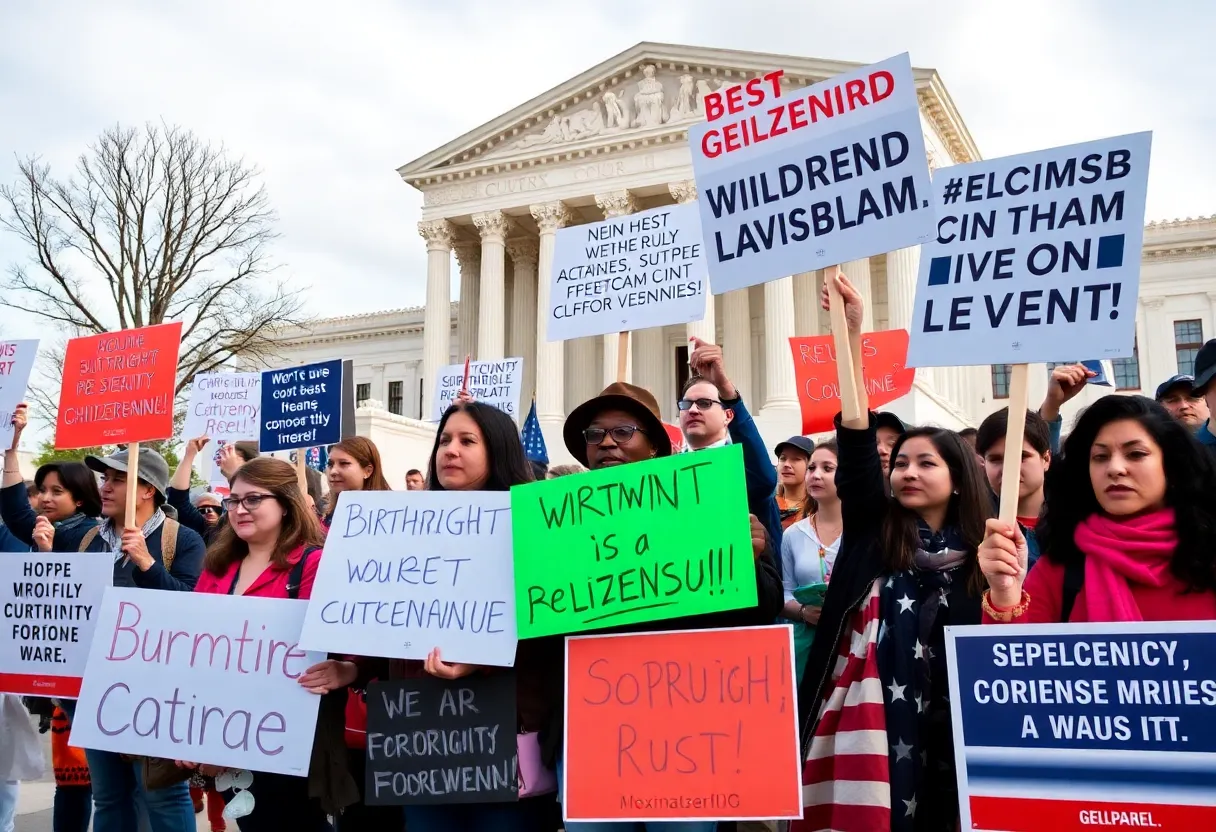

Demonstrators gathered outside the Supreme Court, advocating for the preservation of birthright citizenship.
The Supreme Court is considering whether a district judge can block the Trump administration’s birthright citizenship policy nationwide. The justices are divided on the issue, with some raising concerns about judicial power versus the legality of the executive order. As lower federal judges rule against the order citing the 14th Amendment, the court’s decision could reshape the landscape of citizenship rights and judicial authority. Amid public demonstrations, the implications for future citizenship laws remain significant as a ruling is anticipated this summer.
In a recent session, the Supreme Court tackled a significant issue: whether a single district judge can effectively block the Trump administration’s policy on birthright citizenship across the whole country. This case has drawn considerable attention and debate, yielding a wide array of opinions among the justices.
During oral arguments, it became evident that the justices were split. Some raised valid concerns about the potential for district judges to wield too much power, while others expressed serious doubts about the legality of Trump’s executive order regarding birthright citizenship. This executive order, signed on the president’s first day in office, seeks to end the longstanding practice of granting automatic citizenship to babies born in the U.S. to parents who do not have legal status.
Three lower federal judges already ruled against Trump’s order, determining that it likely violates the 14th Amendment of the Constitution, which has been the cornerstone of citizenship law since its ratification. These judges issued rulings that blocked the order from being enforced nationwide, raising essential questions about the powers of the judiciary.
The Trump administration, on the other hand, argued that nationwide injunctions create unnecessary obstacles to implementing its policy agenda. They contended that such rulings should only apply to the specific states and individuals who brought the lawsuits rather than having blanket applicability across the nation.
Amidst the legal arguments, Chief Justice John Roberts posed a critical question regarding the potential for the court to respond swiftly to the constitutional dilemmas raised by Trump’s executive order. Justice Elena Kagan brought attention to the fact that the government has not fared well in lower courts, raising concerns about avoiding a definitive ruling by the Supreme Court.
The justices explored various ideas on how to handle national injunctions without causing chaos in citizenship rules across the country. This is especially important for expectant parents dealing with uncertainty over citizenship rights for their future children. Attorneys representing states underscored the necessity for maintaining universal injunctions in some scenarios to protect individuals effectively.
Legal experts highlighted the significance of the Supreme Court’s decision, as it could set a vital precedent regarding how federal policies are paused or amended by judges in the future. The conversation also turned toward the implications of potentially creating a patchwork of citizenship laws that could differ significantly from one state to another.
Outside the Supreme Court, demonstrations sprang up as advocates for birthright citizenship voiced their concerns and challenged Trump’s executive order. This public outpouring speaks volumes about how passionately people feel about the rights of children born on U.S. soil.
Central to this legal battle is the interpretation of the 14th Amendment, which has upheld birthright citizenship for over a century. Trump’s administration argues that this amendment was never meant to grant citizenship to children born to parents in the U.S. without authorization. They claim that “birth tourism,” a term they use to describe non-citizens taking advantage of U.S. laws, complicates the issue further.
Solicitor General John Sauer noted the importance of finding a balance between upholding citizenship rights and addressing varying outcomes from lawsuits and injunctions. With a ruling expected by late June or early July, all eyes are on the Supreme Court as they prepare to weigh in on these pressing questions that could reshuffle the power dynamics between the presidency and the judiciary.
News Summary As Small Business Saturday approaches, attention is drawn to the critical role of…
News Summary Eaton Corporation has announced plans to invest $340 million in a new manufacturing…
News Summary Duke Energy has proposed a 12.1% electricity rate increase in South Carolina to…
News Summary Charleston is gearing up for a series of vibrant events in late June,…
News Summary The Charleston City Council is planning to vote on a juvenile curfew ordinance…
News Summary A gas leak on Bees Ferry Road in West Ashley, Charleston led to…